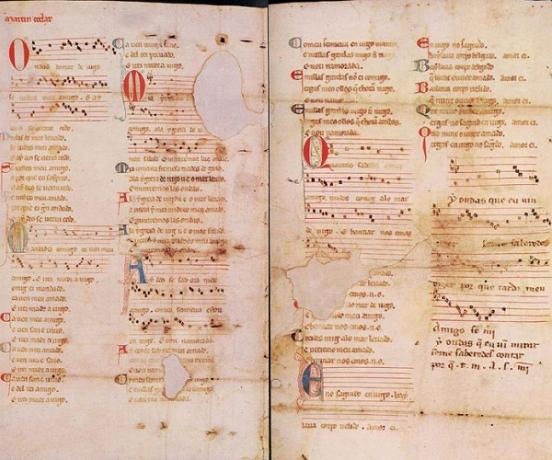Troubadourism was a literature, poetry and songs movement that emerged in the eleventh century in France, in the region of Provence. Later the movement spread to northern France and Italy.
The author of the compositions of the period was called the troubadour. The singer or reciter of poems was called a jester if he was a beginner, or a minstrel if he was more experienced.
Discover the most striking features of troubadour:
1. Relationship between poetry and music
In troubadour, music and poetry were closely linked. The recited poems and verses were accompanied by music and musical instruments such as viola, lyre, flute and harp. For this reason they were called troubadour songs.
The collections of songs from the troubadour period are called songbooks. The best known songbooks are: the Cancioneiro da Biblioteca de Lisboa and the Cancioneiro da Vaticana.

Three farmer musicians (Drei musizierende Bauern) - David Teniers
2. It was divided into two genres: lyrical and satirical
Troubadourism was divided into two very different genres: the lyrical and the satirical.
The lyrical troubadourism had love and friend songs, which recounted the sensations and feelings involved in these relationships. The literary and poetic production of the troubadour period was very much focused on the theme of love and love suffering. These themes were dealt with in the love songs and friend songs.
The satirical troubadourism, with its acidic, satirical and mocking humor, criticized the way of life in the feudal society of the time. The satirical songs are also very characteristic of the songs that were produced in this period. They were divided into two types: mocking songs and cursing songs.
Both were songs that made satires or mockery, but there was a difference between them in relation to the way the satire was done. The mocking song was lighter and the cursing song was more direct and acidic in its content.
3. They were about love and veneration when being loved
In love songs, the troubadours wrote in the first person and it was common for them to put themselves in a position of inferiority and submission in relation to the woman they loved.
There was a strong tendency to veneration and adoration of the beloved woman, who was idealized and unattainable, just as love itself was idealized.
The love described in troubadours was full of courtesy, but it was painful and had characteristics of an impossible or unrequited love.
See this example of Afonso Fernandes' love song:
My lady, since I saw you,
I fought to hide this passion
which took my heart whole;
but I can't do it anymore and I decided
let everyone know my great love,
the sadness I have, the immense pain
I suffer from the day I saw you.
4. they were about friendship
In the songs of a friend, the main theme discussed was friendship or love-friendship. The songs of a friend were carried out by a narrator woman, not idealized and humble, who declared her friendship to a friend or to a platonic love.
A curiosity about the songs of friend is that, although the troubadours who wrote the songs were men, they were written in first person and always in female.
These songs were characterized by a strong feeling of suffering, sadness and anguish at the separation from a friend or a loved one.
Check out this song by D's friend. Dinis:
If you know anything about my friend,
the one who lied about what he put with me!
Oh God, are you?If you know anything about my beloved,
the one who lied than I sworn!
Oh God, are you?

Sheet music of a friend's song by Martim Codax.
5. They criticized the political and social context of the time
Troubadourism emerged in the Middle Ages, a period in which society lived feudalism.
For this reason, one of the main themes of the satirical songs was the criticism made to the way of life in the feudal society of the time.
6. Use of puns and ambiguous terms
The use of these terms was common in derision songs, which were lighter and contained satire in an indirect way. These songs were made up of phrases with double meanings and puns that indirectly satirized the object of the song.
See Joan Garcia de Guilhade's derision song:
Hey! Ugly Mistress! May God forgive me!
For voice you have a good heart
That I voice will praise for this reason,
What a voice will I praise yet, And see what the praise will be
Ugly, old and crazy owner!
7. bluntly made reviews
The cursing songs, in contrast to the mocking songs, were much more direct and aggressive. In some cases swear words were used and even names were mentioned by the troubadours.
Read this cursing song by Afonso Eanes de Coton:
Navy, I think I'm off the hook,
and I am amazed not to see you burst;
for with this my mouth I cover your mouth, Marina;
and with this nose of mine, I cover, Marina, yours
8. They reflected the way of life in the feudal aristocracy
As troubadour emerged in the period of the heyday of feudalism, much of what was produced in literature and poetry at the time reflected the way of life and customs of aristocratic feudal society.
You behaviors and values of the time, the relations between feudal lords and their vassals and the theme of the Crusades were themes of troubadour songs. Feudalism and the aristocratic way of life were often sarcastically described in satirical songs.
Learn about the meanings of Troubadourism, jester and Feudalism.
